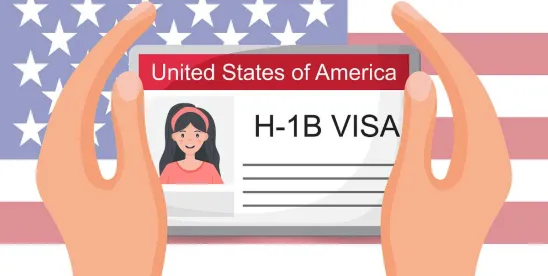Tucked away in the Code of Federal Regulations is a statute that provides employment authorization to nonimmigrants – such as holders of E-3, H-1B, H-1B1, L-1, or O-1 visas – who are in positions of last resort. Unfortunately, getting U.S. Citizenship and Immigration Services (USCIS) to approve an application for an Employment Authorization Document (EAD) under this stopgap provision may prove arduous and problematic.
However, with USCIS’s recent new guidance aimed at addressing EAD adjudication standards, approval rates may improve and individuals with compelling circumstances may be able to start obtaining this benefit.
USCIS guidance, documented in Volume 10 of the USCIS Policy Manual, provides comprehensive direction on eligibility criteria and application standards for obtaining an EAD based on compelling circumstances. Below are key aspects of this new guidance and its significance in assisting eligible nonimmigrants during difficult times.
A Common Scenario
An H-1B employee – “Kiran” – who is an Indian-born IT professional and has lived in the United States for nine years, is laid-off by his employer. He is given two weeks of severance and has a 60-day grace period in H-1B status. Kiran is the beneficiary of an approved I-140, Immigrant Petition. However, this I-140 is retrogressed and Kiran – who has been waiting for more than seven years for his priority date to become current – cannot file the final stage of his green card application, the I-485, Adjustment of Status Application due to retrogression. Kiran now faces challenging circumstances unless he can remain and work in the United States beyond the 60-day grace period:
-
His spouse has a significant ongoing medical concern.
-
He will need to end the college education of his two children.
-
He must sell their home or default on the mortgage.
Failure to secure H-1B sponsorship with a new employer within 60 days of his termination likely would require Kiran to return to India with his family. Facing these facts, Kiran would be a good candidate for a compelling circumstances-based EAD.
Background on Employment Authorization for Noncitizens
In order to work legally in the United States, noncitizens must obtain employment authorization. While certain individuals are granted automatic employment authorization based on their immigration status or circumstances, others must apply for it, and USCIS has the discretion to grant or deny it. In certain limited circumstances, employment authorization may be provided to individuals who face delays in obtaining immigrant visas due to backlogs. However, USCIS guidance specifically focuses on noncitizens experiencing compelling circumstances beyond the usual hardships associated with job loss.
Eligibility Criteria and Standards for EADs Based on Compelling Circumstances
The policy guidance outlines the eligibility criteria for both initial and renewal applications for an EAD based on compelling circumstances, applicable to both the principal applicant and their dependents. To qualify for an EAD based on compelling circumstances, noncitizens must be in the United States in valid E-3, H-1B, H-1B1, O-1, or L-1 nonimmigrant status or authorized grace period when they file the Form I-765, at the time of filing the EAD application. Additionally, they must be the principal beneficiaries of approved I-140 petitions and must demonstrate compelling circumstances justifying the need for an EAD. Furthermore, individuals with pending adjustment of status applications (form I-485) or whose priority dates are current in the final action chart of the visa bulletin are ineligible for this EAD category. For an applicant to be eligible for an initial EAD based on compelling circumstances, they must also provide biometrics as required and they must not have been convicted of a felony or two or more misdemeanors
Establishing Compelling Circumstances and Supporting Evidence
USCIS provides a non-exhaustive list of situations that may warrant a finding of compelling circumstances. These include serious illness or disability, employer disputes or retaliation, significant harm to the applicant, or substantial disruption to the employer. The policy guidance offers instruction on the evidence that applicants can submit to demonstrate compelling circumstances. For instance, if an individual with a serious illness or disability needs to relocate for treatment and leave their sponsoring employer, relevant medical records and supporting information should be included.
Adjudication Process and Validity Periods
The USCIS policy update explains the process of adjudicating EAD applications based on compelling circumstances and specifies the maximum validity periods that USCIS may authorize. Noncitizens with a valid EAD under compelling circumstances, such as those outlined for Kiran, are considered to be in a period of authorized stay and are not deemed to be accruing unlawful presence. While they may become ineligible for adjustment of status under INA 245(a), they can later depart the United States to apply for an immigrant or nonimmigrant visa at a consular post abroad without triggering the grounds of inadmissibility due to unlawful presence, as long as they have not already accumulated periods of unlawful presence.
Implications and Application Process
The USCIS policy guidance on employment authorization based on compelling circumstances serves as a temporary measure to assist eligible nonimmigrants facing particularly challenging situations. The update not only provides guidance on eligibility criteria and the adjudication process but also highlights the types of evidence required to support compelling circumstance-based EADs. This policy is effective immediately and applies to applications filed on or after June 14, 2023.
Conclusion
Given the amount of recent layoffs, this policy announcement by USCIS may offer a relief mechanism for nonimmigrants like Kiran – people facing unforeseen difficulties. Nonimmigrants experiencing compelling circumstances should consider consulting with an immigration attorney to determine their eligibility for this benefit and receive guidance on the application process.



 />i
/>i

